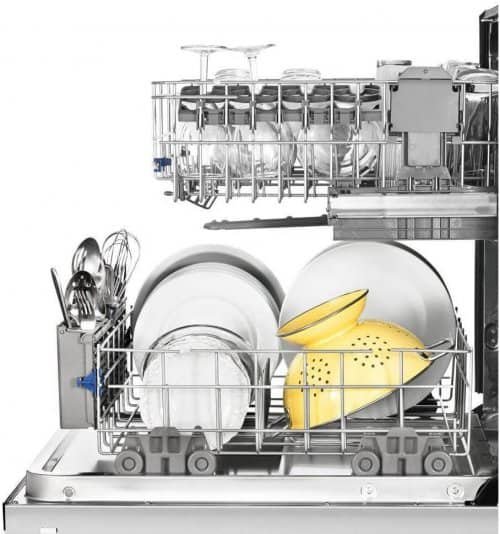Keeping your dishwasher smelling fresh between washes is essential for maintaining a clean and odor-free kitchen. No one wants to open their dishwasher only to be greeted by an unpleasant smell. Fortunately, with a few simple steps and regular maintenance, you can ensure that your dishwasher stays fresh and clean. In this article, we will provide you with effective tips on how to keep your dishwasher smelling pleasant and avoid any unwanted odors.
Table of Contents
Understanding the Causes of Dishwasher Odor
Before we dive into the solutions, it’s important to understand what causes dishwasher odor. Over time, food particles, grease, and soap scum can accumulate in the dishwasher, leading to bacterial growth and unpleasant smells. Poor loading techniques, improper maintenance, and using low-quality detergents can also contribute to odor problems. By addressing these underlying causes, you can prevent and eliminate dishwasher odors.
Regular Cleaning and Maintenance
Regular cleaning and maintenance are crucial for keeping your dishwasher fresh. Here are some important steps to include in your cleaning routine:
- Cleaning the Filter
- Wiping Down the Interior
- Cleaning the Spray Arms
- Running Vinegar or Citric Acid Cycle
Cleaning the Filter
Start by cleaning the dishwasher filter. The filter prevents food particles from clogging the drain and helps maintain proper water circulation. Locate the filter, typically at the bottom of the dishwasher, and remove it. Rinse it under running water to remove any debris or residue. For stubborn stains, use a soft brush and mild detergent to gently scrub the filter.
Wiping Down the Interior
Next, wipe down the interior of the dishwasher. Use a damp cloth or sponge and a mild dishwashing detergent to clean the walls, racks, and door. Pay special attention to the areas around the door gasket and the detergent dispenser. These areas can harbor residue and contribute to odors if not cleaned regularly.
Cleaning the Spray Arms
The spray arms distribute water during the wash cycle, so it’s essential to keep them clean. Remove the spray arms and rinse them under running water to remove any debris or mineral deposits. Use a toothpick or a small brush to clear any clogs in the spray arm nozzles. Once clean, reattach the spray arms to the dishwasher.
Running Vinegar or Citric Acid Cycle
Another effective way to clean your dishwasher is by running a cycle with vinegar or citric acid. Place a cup of white vinegar or citric acid powder in a dishwasher-safe container on the top rack. Run a hot water cycle without any dishes. The vinegar or citric acid will help dissolve grease, remove odors, and leave your dishwasher smelling fresh.

Proper Loading Techniques
Proper loading techniques not only ensure clean dishes but also help prevent dishwasher odors. Follow these guidelines for optimal loading:
- Scrape Off Food Residues
- Avoid Overloading the Dishwasher
- Use Proper Detergent and Rinse Aid
- Empty the Dishwasher Promptly
Scrape Off Food Residues
Before loading dishes, scrape off excess food residues into the trash. Food particles left on plates and utensils can accumulate in the dishwasher, leading to odors. A quick pre-rinse or scrape can significantly reduce the chances of food particles clogging the dishwasher drain or spray arms.
Avoid Overloading the Dishwasher
Overloading the dishwasher can impede water circulation and hinder effective cleaning. It can also trap food particles and increase the likelihood of odors. Be mindful of the dishwasher’s capacity and arrange dishes in a way that allows water to reach all surfaces easily.
Use Proper Detergent and Rinse Aid
Using a high-quality detergent and rinse aid is crucial for preventing odors. Choose detergents specifically designed for dishwashers and follow the manufacturer’s instructions for optimal results. Additionally, using a rinse aid can help reduce spotting and eliminate any residual odors.
Empty the Dishwasher Promptly
Once the dishwasher cycle is complete, make it a habit to empty it promptly. Leaving clean dishes in the closed dishwasher can trap moisture and create an environment for bacteria to thrive, resulting in unpleasant odors. So, unload the dishwasher as soon as the cycle finishes to keep it fresh.
Addressing Persistent Odors
In some cases, persistent odors may require additional measures. Here are a few effective methods to tackle stubborn dishwasher smells:
- Deodorizing with Baking Soda
- Using White Vinegar
- Lemon or Orange Peel Method
- Odor-Absorbing Products
Deodorizing with Baking Soda
Baking soda is a natural deodorizer that can help eliminate lingering odors. Sprinkle a cup of baking soda on the bottom of the dishwasher and let it sit overnight. The baking soda will absorb odors, leaving your dishwasher smelling fresh. In the morning, run a hot water cycle to rinse away the baking soda.
Using White Vinegar
White vinegar is another excellent natural cleaner and deodorizer. Fill a dishwasher-safe bowl with white vinegar and place it on the top rack. Run a hot water cycle without any dishes. The vinegar will help break down grease and remove odors, leaving your dishwasher fresh and clean.
Lemon or Orange Peel Method
Citrus peels can provide a pleasant fragrance while eliminating odors. Place a few lemon or orange peels in the silverware basket or at the bottom of the dishwasher. Run a hot water cycle, and the natural oils from the peels will freshen up the dishwasher, leaving behind a citrusy scent.
Odor-Absorbing Products
If the above methods don’t fully eliminate the odors, you can consider using odor-absorbing products specifically designed for dishwashers. These products, such as dishwasher deodorizers or odor-removing gels, can help neutralize unpleasant smells and keep your dishwasher smelling fresh for longer periods.
Preventing Future Odors
Prevention is key when it comes to maintaining a fresh-smelling dishwasher. Here are some preventive measures you can take:
- Regular Maintenance Schedule
- Leaving the Door Ajar
- Running Hot Water Before a Cycle
- Checking the Water Temperature
Regular Maintenance Schedule
Establish a regular maintenance schedule for your dishwasher. This includes cleaning the filter, wiping down the interior, and checking the spray arms. By incorporating these tasks into your routine, you can prevent the buildup of odors and keep your dishwasher in optimal condition.
Leaving the Door Ajar
After running a cycle, leave the dishwasher door slightly ajar to allow moisture to escape. This will help prevent the growth of bacteria and reduce the chances of odors forming. However, ensure that it’s safe to do so and there are no young children or pets around who might get injured.
Running Hot Water Before a Cycle
Before starting a dishwasher cycle, run the hot water in your kitchen sink until it becomes hot. This ensures that hot water is readily available for the dishwasher, which helps with effective cleaning and odor elimination.
Checking the Water Temperature
Check the water temperature setting on your dishwasher. It’s recommended to use a high-temperature setting for optimal cleaning and odor control. Hot water kills bacteria and helps dissolve grease and food residues more effectively.
How do I stop my dishwasher from smelling in between loads?
To help prevent your dishwasher from smelling in between loads, there are a few steps you can take. First, make sure to always scrape off any large food particles before loading the dishes. This will help ensure that nothing gets stuck in the filter and starts to smell. Secondly, run a cycle with a cup of white vinegar every month or so. The vinegar helps to break down any built-up residue and kill any bacteria that may be causing the odor. Lastly, keep the door open after each wash so that air can circulate and dry out any moisture. This will help keep mold and mildew from forming and causing an unpleasant smell.
Why does my dishwasher smell between washes?
A smelly dishwasher is a common problem, and there are a few possible causes. One cause could be food particles that have been left behind after washing. These can get stuck in the filter or other crevices of the dishwasher, leading to an unpleasant odor. To prevent this from happening, it’s important to rinse off dishes before placing them in the dishwasher. Additionally, you should regularly clean out the filter and any other parts of the dishwasher where food debris may accumulate.
Another potential cause of a smelly dishwasher is mold or mildew buildup. This can occur if water is left standing for too long after a cycle has finished. To prevent this from happening, you should run your dishwasher on a regular basis and make sure that all dishes are completely dry before storing them away after washing. Additionally, you can periodically use a cleaning solution specifically designed for removing mold and mildew to keep your dishwasher smelling fresh.
Why do my dishes smell after washing in the dishwasher?
There are a few possible explanations for why your dishes smell after washing in the dishwasher. The first is that the dishwasher may not be cleaning your dishes properly. Make sure you use the right cycle and detergent for the type of dishes you’re washing, and check to see if any food particles are getting stuck in crevices or hard-to-reach places.
Another possibility is that there could be a buildup of bacteria or mold in the dishwasher itself. This can happen if you don’t regularly clean out the filter and drain, so make sure to do this periodically. You should also run an empty cycle with a cup of white vinegar every month or two to help kill any bacteria that may have built up over time.
Finally, it’s possible that your water supply could be causing the smell. If this is the case, you’ll want to contact your local water provider to find out what’s going on and how to fix it.
Can I use bleach to remove dishwasher odor?
While bleach may seem like a powerful cleaning agent, it’s not recommended for use in dishwashers. Bleach can damage the rubber components and seals inside the dishwasher. Instead, opt for natural cleaning methods like vinegar or baking soda.
How often should I clean my dishwasher?
Regular cleaning is essential to prevent odors. Aim to clean your dishwasher at least once a month, or more frequently if you notice any lingering smells or buildup.
What can I do if my dishwasher smells like rotten eggs?
A rotten egg smell in your dishwasher can indicate a problem with the water supply or a clogged drain. In such cases, it’s best to contact a professional plumber to address the issue.
Is it normal for dishwashers to have a slight odor?
While dishwashers should not have a strong or unpleasant odor, a slight odor may be normal due to the accumulation of food residues. Regular cleaning and maintenance can help minimize any odors.
Can I use essential oils to freshen up my dishwasher?
It’s not recommended to use essential oils directly in the dishwasher as they can leave residues and potentially damage the dishwasher. Stick to natural deodorizing methods like vinegar, baking soda, or citrus peels.
Conclusion
By following these tips and maintaining a regular cleaning and maintenance routine, you can keep your dishwasher smelling fresh between washes. Proper loading techniques, addressing persistent odors, and preventing future odors will ensure that your dishwasher not only provides clean dishes but also a pleasant kitchen environment. Say goodbye to unpleasant odors and enjoy the convenience of a clean and fresh dishwasher.


1 thought on “How to keep Dishwasher from Smelling between Washes”
Comments are closed.